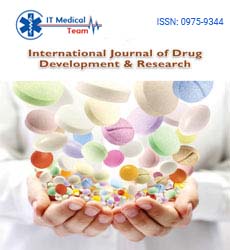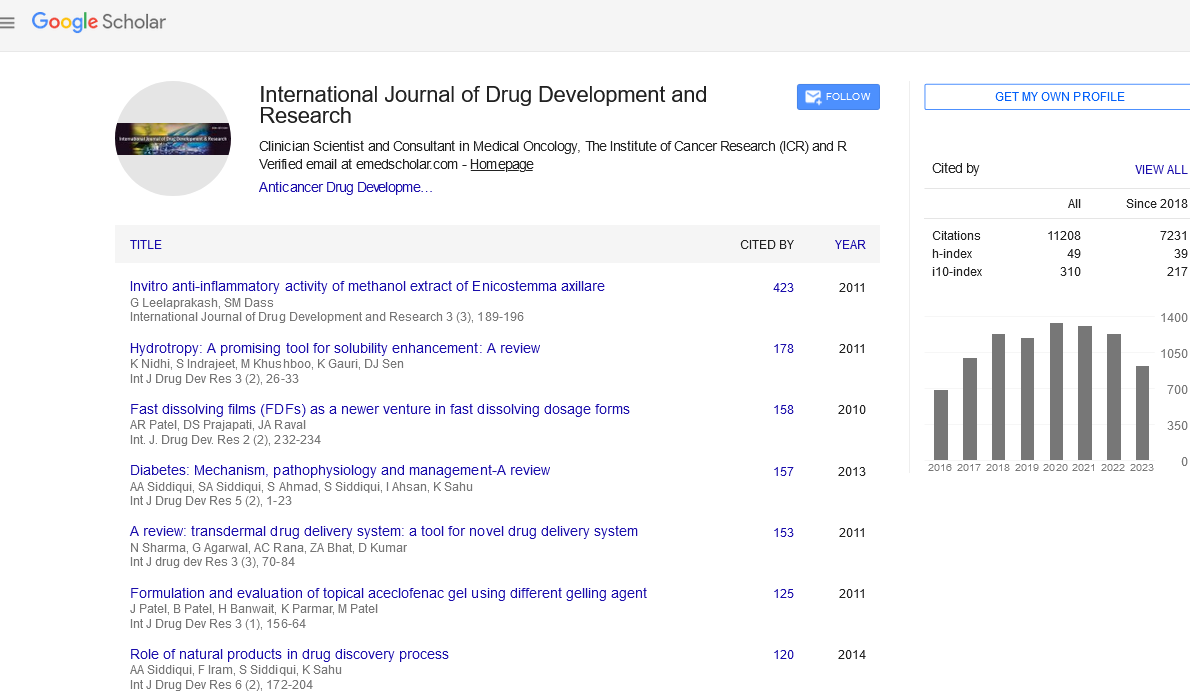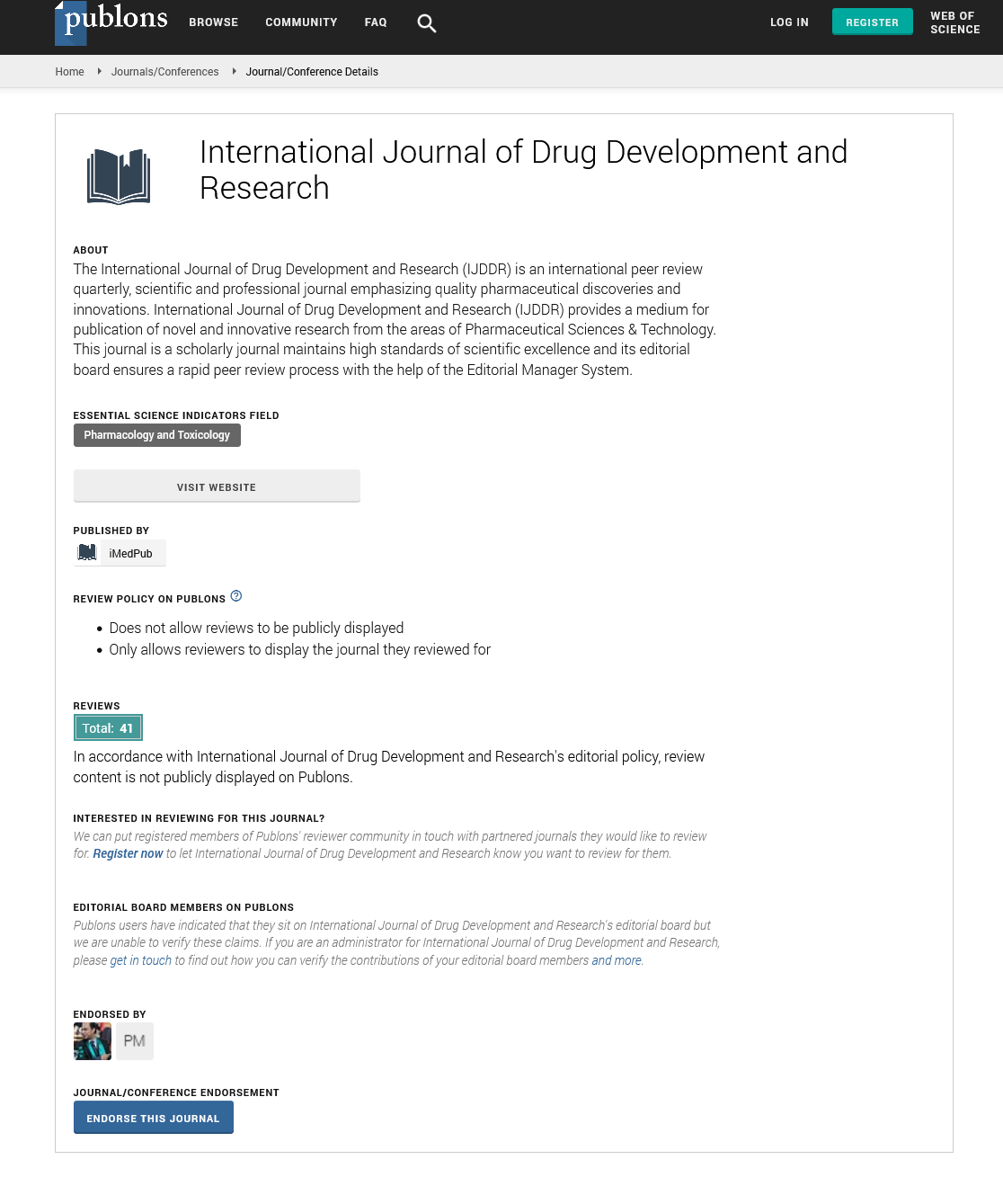Editorial - (2022) Volume 14, Issue 6
Colorectal Cancer Epigenetics, Colorectal Cancer Stem Cells, and the Pharmacogenetic of Anticancer Drug Toxicity and Sensitivity in Colorectal Cancer
Eva Bandres*
Department of Pharmacogenomics, Center for Applied Medical Research, University of Navarra, Avda Pio, Spain
*Correspondence:
Eva Bandres, Department of Pharmacogenomics, Center for Applied Medical Research, University of Navarra, Avda Pio,
Spain,
Email:
Received: 01-Jun-2022, Manuscript No. IJDDR-22-12807;
Editor assigned: 03-Jun-2022, Pre QC No. IJDDR-22-12807;
Reviewed: 25-Jun-2022, QC No. IJDDR-22-12807;
Revised: 30-Jun-2022, Manuscript No. IJDDR-22-12807;
Published:
08-Jul-2022, DOI: 10.36648/1791-809X.22.16.958
Editorial
Colorectal Cancer
A key factor in the failure of anticancer treatments and adverse
medication events in cancer patients is inter-individual variability
in drug response. To discover new genetic biomarkers to
predict toxicity and response to anticancer medicines, gene
polymorphisms connected to these outcomes have been
researched. [1] A promising method to choose the right therapy
regimens with the fewest side effects is to assess the usefulness
of single nucleotide polymorphisms (SNPs) in the genes involved
in the transportation, activation, and metabolism of anticancer
medicines. [2] This study provides an overview of the current
understanding of the association between SNPs implicated in the
movement, activation, and metabolism of anticancer medicines
and the prognosis of patients with colorectal cancer (CRC). ¬Each
year, more than 500,000 patients are given a colorectal cancer
diagnosis, and more than 600,000 develop the disease and pass
away. [3] The incidence strongly varies around the globe and is
closely related to aspects of what is considered the "western
lifestyle." Men are more likely to be affected than women are,
and the incidence rises sharply with age; in industrialised nations,
the median age of diagnosis is around 70. The majority of
colorectal cancer cases are sporadic, develop slowly over years,
and have substantial genetic components.[4] They follow the
adenoma-carcinoma sequence. The three pillars of treatment are
surgery, adjuvant chemotherapy, and neoadjuvant radiotherapy.
Patients with stage I disease have a relative 5-year survival rate
of more than 90%, whereas those with stage IV cancer have a
relative 5-year survival rate of just over 10%. The incidence and
death of colorectal cancer have been demonstrated to decrease
with screening. In the last ten years, significant advancements
have been made in the treatment of colorectal cancer. [5] The
results have improved because to screening, which is used to
find people early on. It is now possible to identify patients who
are at risk and better understand the genetic underpinnings
of inherited colorectal cancer. Survival at 5 years and 10 years
has been significantly impacted by surgical optimization for
patients with localized illness. [6] When choosing patients for
preoperative chemoradiation, a technique that has been shown
to enhance outcomes in patients with rectal cancer, it is crucial
to identify those who are most at risk of local failure. Strict
postoperative monitoring increases long-term survival and aids
in the early detection of oligometastatic disease that may be
drastically curable. Stage III disease is now commonly treated
with oxaliplatin-based combination chemotherapy, albeit
efficacy and toxicity must be carefully controlled.[7] Treatment
with adjuvant fluoropyrimidine for colon and rectal cancers
significantly increases survival, more so in stage III than in stage
II disease. The selection of patients for treatment in stage II
illness may be aided by molecular indicators such microsatellite
instability. The expansion of the therapy of metastatic
disease through the combination of targeted therapies and
traditional cytotoxic medications has led to incremental survival
improvements.[8] However, the creation of biomarkers is crucial
to assist in the selection of patients likely to react to therapy,
rationalizing treatments and enhancing outcomes. According to
the cancer stem cell theory, a small subset of a tumor cells are
the only ones that may cause it to grow.[9] Because conventional chemotherapy and radiotherapy target fast growing cells that
make up the majority of the tumour rather than particularly
cancer stem cells, if this concept were to be confirmed, it would
have a substantial impact on how we now treat cancer. [10]
The goals of this review are to highlight the most recent data
demonstrating the presence of cancer stem cells in colorectal
cancer, to evaluate the relative merits of the most recent
cancer stem cell markers, and to explain the implications of this
for cancer treatment. [11] The majority of the time, colorectal
cancer has been thought of as a genetic illness caused by a
gradual accumulation of genetic abnormalities. [12] Growing
data suggests that epigenetic changes describe a minority of
colorectal tumours with a unique aetiology and prognosis,
and add another level of complexity to the pathogenesis of
CRC. Colorectal cancer epigenetic dysregulation include DNA
methylation, histone changes, nucleosomal occupancy and
remodelling, chromatin looping, and noncoding RNAs at various
levels.[13] Recently, intricate correlations with genetic changes
and interactions between these processes have been uncovered.
[14] As CRC genetics has been for the previous thirty years, it
looks that CRC epigenetics will serve as the paradigm for multistep
carcinogenesis. This review discusses how the comprehension of
epigenetic regulation of gene expression in CRC has improved
with the integration of fresh data.
Acknowledgement
The author would like to acknowledge his Department of
Pharmacogenomics, Center for Applied Medical Research from
the University of Navarra for their support during this work.
Conflicts of Interest
The author has no known conflicts of interested associated with
this paper.
References
- Parkin DM (2001) Global cancer statistics in the year 2000.Lancet Oncol 2: 533–543.
Indexed at, Google Scholar, Crossref
- Douillard JY, Cunningham D, Roth AD, Navarro M, James RD, et al. (2000) Irinotecan combined with fluorouracil compared with fluorouracil alone as first-line treatment for metastatic colorectal cancer: a multicentre randomised trial.Lancet 355: 1041–1047.
Indexed at, Google Scholar, Crossref
- Giacchetti S, Perpoint B, Zidani R, Le Bail N, Faggiuolo R, et al.(2000) Phase III multicenter randomized trial of oxaliplatin added to chronomodulated fluorouracil-leucovorin as first-line treatment of metastatic colorectal cancer.J Clin Oncol 18: 136–147.
Indexed at, Google Scholar, Crossref
- Cunningham D, Humblet Y, Siena S, Khayat D, Bleiberg H, et al.(2004) Cetuximab monotherapy and cetuximab plus irinotecan in irinotecan-refractory metastatic colorectal cancer. N Engl J Med351: 337–345.
Indexed at, Google Scholar, Crossref
- Hurwitz H, Fehrenbacher L, Novotny W, Cartwright T, Hainsworth J, et al.(2004)Bevacizumab plus irinotecan, fluorouracil, and leucovorin for metastatic colorectal cancer.N Engl J Med 350: 2335–2342.
Indexed at, Google Scholar, Crossref
- Evans WE, McLeod HL (2003) Pharmacogenomics--drug disposition, drug targets, and side effects.N Engl J Med 348: 538–549.
Indexed at, Google Scholar, Crossref
- Salonga D, Danenberg KD, Johnson M, Metzger R, Groshen S, et al. (2000)Colorectal tumors responding to 5-fluorouracil have low gene expression levels of dihydropyrimidine dehydrogenase, thymidylate synthase, and thymidine phosphorylase.Clin Cancer Res 6: 1322–1327.
Indexed at, Google Scholar, Crossref
- Milano G, Ferrero JM, François E (2004) Comparative pharmacology of oral fluoropyrimidines: a focus on pharmacokinetics, pharmacodynamics and pharmacomodulation.Br J Cancer91: 613–617.
Indexed at, Google Scholar, Crossref
- Iyer L, Das S, Janisch L, Wen M, Ramírez J, et al. (2002) UGT1A1*28 polymorphism as a determinant of irinotecan disposition and toxicity.Pharmacogenomics J2: 43–47.
Indexed at, Google Scholar, Crossref
- Gill S, Loprinzi CL, Sargent DJ, Thomé SD, Alberts SR, et al. (2004) Pooled analysis of fluorouracil-based adjuvant therapy for stage II and III colon cancer: who benefits and by how much?J Clin Oncol 22: 1797–1806.
Indexed at, Google Scholar, Crossref
- Myers CE, Young RC, Chabner BA (1975) Biochemical determinants of 5-fluorouracil response in vivo. The role of deoxyuridylate pool expansion.J Clin Invest 56: 1231–1238.
Indexed at, Google Scholar, Crossref
- Van Triest B, Pinedo HM, Giaccone G, Peters GJ (2000) Downstream molecular determinants of response to 5-fluorouracil and antifolate thymidylate synthase inhibitors.Ann Oncol 11: 385–391.
Indexed at, Google Scholar, Crossref
- Leichman CG, Lenz HJ, Leichman L, Danenberg K, Baranda, J et al. (1997) Quantitation of intratumoral thymidylate synthase expression predicts for disseminated colorectal cancer response and resistance to protracted-infusion fluorouracil and weekly leucovorin.J Clin Oncol15: 3223–3229.
Indexed at, Google Scholar, Crossref
- Paradiso A, Simone G, Petroni S, Leone B, Vallejo C, et al. (2000) Thymidilate synthase and p53 primary tumour expression as predictive factors for advanced colorectal cancer patients.Br J Cancer82: 560–567.
Indexed at, Google Scholar, Crossref
Citation: Bandres E (2021) Colorectal Cancer
Epigenetics, Colorectal Cancer Stem Cells,
and the Pharmacogenetic of Anticancer
Drug Toxicity and Sensitivity in Colorectal
Cancer. Int J Drug Dev Res J , Vol.14 No. 6:
958.
Competing interests: The authors have declared that no competing interests exist.






